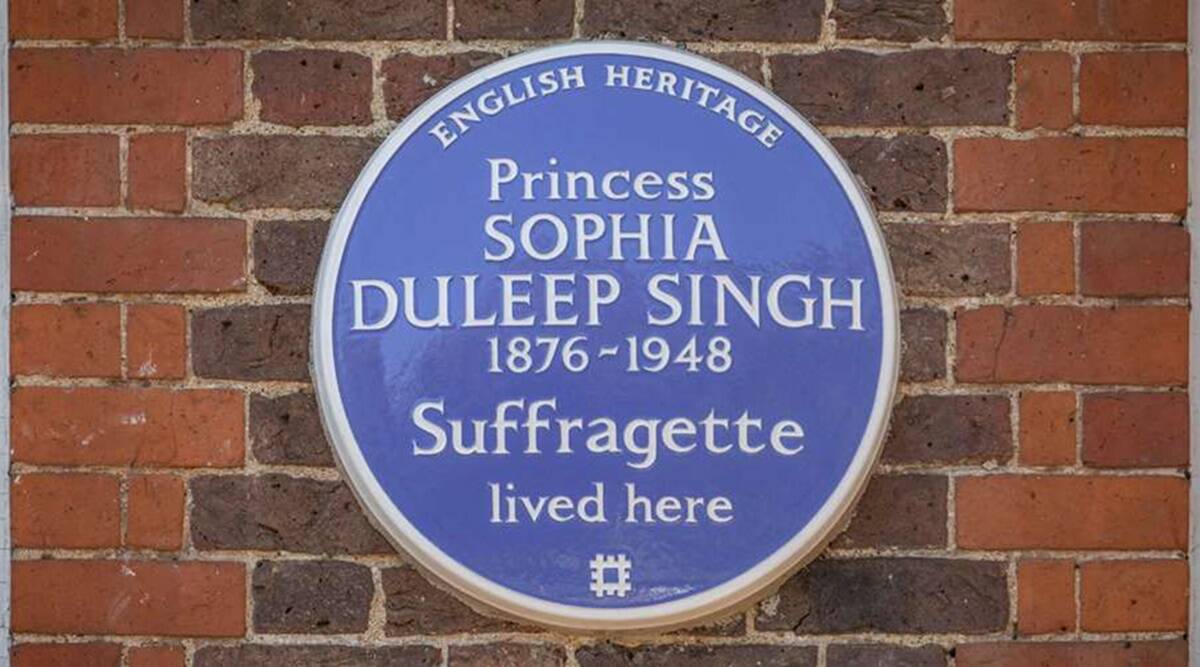She was the daughter of Maharaja Duleep Singh and the goddaughter of Queen Victoria
London: Princess Sophia Duleep Singh, the daughter of Maharaja Duleep Singh – the last ruler of the Sikh empire – and the goddaughter of Queen Victoria, was honoured with a commemorative Blue Plaque in London on Friday, May 26, a special report in The Tribune, Chandigarh, says.
The Blue Plaque scheme, run by the English Heritage charity, honours the significance of particular buildings associated with historical figures.
In memory of the British-Indian Princess, it now adorns Faraday House, which was granted to Sophia and her sisters as a grace and favour apartment at Hampton Court Palace southwest of London by Queen Victoria.
“As a political journalist, I thought I knew the story of the suffragettes, and then I found this extraordinary woman and she blew me away,” said Anita Anand, the author of the biography ‘Sophia: Princess, Suffragette, Revolutionary’.
“As the last princess of the Sikh Empire, goddaughter of Queen Victoria, society darling and fashion icon, a life of comfort and celebrity was hers for the taking, but she chose a harder path. Using her international fame and influence, putting herself in physical danger, she fought for the right of women to vote. Campaigning with unrelenting ferocity, loyalty and selflessness, she moved the dial,” she said.
Named after another former resident, the eminent English physicist Michael Faraday (1791–1867), Faraday House was Princess Sophia’s main residence for over four decades.
Furnished to her luxurious taste, the house – or “Apartment 41” to give it its grace-and-favour title – was Princess Sophia’s base during the many years she campaigned as a suffragette for women’s voting rights.
Peter Bance, a British Sikh historian, art collector and author of ‘Sovereign, Squire and Rebel: Maharajah Duleep Singh & the Heirs of the Lost Kingdom’ who campaigned for the plaque said, “I came upon the story of the princess when I was researching her father Duleep Singh at a time when no one had heard about her. It was as if her story had been erased from history. But once a forgotten princess, she has now become an icon.”
Uniquely spanning the very different worlds of the British court and the movement for women’s suffrage in the early 20th century, Sophia Duleep Singh made full use of her royal title and public persona.
“I remember my godmother Princess Sophia telling me about the suffragettes and how women weren’t always allowed to vote as we walked through the gardens at Hampton Court together. And then, as a child, I made a solemn vow to her that I would always exercise my right to vote, and I always have,” said Drovna Oxley, goddaughter to Princess Sophia.
The princess, who died aged 71 in August 1948, dared the authorities to punish her as she shrewdly chose which political protests to attend, ones they could not ignore. Her residence at Faraday House was not without controversy as reflected in a much-publicised photograph of her selling ‘The Suffragette’ paper outside Hampton Court Palace, which led to her eviction from the property being discussed in court and government circles.
“Princess Sophia was a fascinating and important figure, but her story was not at all well known in the decades following her death. I’m delighted that interest in her has grown in recent years. English Heritage hopes that our blue plaque will help ensure that she’s firmly established in the pantheon of great campaigners for women’s suffrage,” said Anna Eavis, Curatorial Director at English Heritage.
Duleep Singh was the last Maharaja of Punjab as the son and heir of Maharaja Ranjit Singh who was exiled to England as a teenager in 1854. He shared a close bond with Queen Victoria until he grew critical of the British Empire in later life.
*******************************************************
Readers
These are extraordinary times. All of us have to rely on high-impact, trustworthy journalism. And this is especially true of the Indian Diaspora. Members of the Indian community overseas cannot be fed with inaccurate news.
Pravasi Samwad is a venture that has no shareholders. It is the result of an impassioned initiative of a handful of Indian journalists spread around the world. We have taken the small step forward with the pledge to provide news with accuracy, free from political and commercial influence. Our aim is to keep you, our readers, informed about developments at ‘home’ and across the world that affect you.
Please help us to keep our journalism independent and free.
In these difficult times, to run a news website requires finances. While every contribution, big or small, will makes a difference, we request our readers to put us in touch with advertisers worldwide. It will be a great help.
For more information: pravasisamwad00@gmail.com











